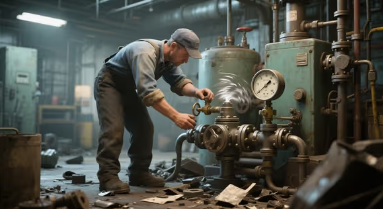High pressure regulating valve, gas pressure regulating valve, pressure regulator
Safety valve gas control pump accessories pressure regulator is an indispensable key component in the gas system. As a protective device, the safety v...
See Details1.Revolutionizing Gas Management: Smart Regulators Lead Industrial Transformation
1.1 Traditional Methods Fall Short in Precision and Safety
In legacy industrial setups, gas pressure regulation typically relies on manual adjustments or rudimentary mechanical devices. While sufficient in earlier production eras, these methods are increasingly incapable of meeting the precision demands of modern automated environments. Human error, device wear, and environmental factors contribute to unstable gas pressure, leading to equipment failures, safety risks, and suboptimal output.
1.2 The Rising Importance of Precision in Industrial Gas Control
Gas plays a critical role as both a raw material and energy source in sectors such as metallurgy, chemicals, electronics, and food processing. Even minor deviations in pressure can compromise product integrity or halt operations. Today’s high-performance manufacturing demands continuous, tightly controlled gas flow—something manual systems struggle to deliver.
1.3 Introducing Smart Gas Pressure Regulators: A Modern Solution
Smart Gas Pressure Regulators incorporate real-time sensors, digital control logic, and data analytics to deliver exact gas pressure control. These devices automatically respond to system changes and production requirements, eliminating delays caused by human response times. Their integration into industrial systems marks a significant shift toward intelligent manufacturing and sustainable energy practices.

2.Smart Regulation in Action: Real-Time Control for Consistent Performance
2.1 Integrated Sensors Enable Continuous Monitoring and Response
Smart regulators are equipped with high-precision sensors that continuously track variables such as pressure, flow rate, and temperature. The data is analyzed in real time by embedded control systems, which can instantaneously adjust output to maintain target conditions. This proactive approach prevents pressure spikes and ensures stable operation even in dynamic environments.
2.2 Automation Eliminates Human Error and Operational Downtime
Unlike traditional regulators that require manual oversight and frequent recalibration, smart regulators operate autonomously. They reduce reliance on operator intervention and eliminate the risk of miscalculation or delayed response. This ensures that the system maintains consistent gas pressure even as production demands or environmental conditions fluctuate.
2.3 Ensuring Safety and Quality Through Intelligent Feedback Loops
The closed-loop feedback system of a smart gas regulator ensures continuous alignment with production parameters. If anomalies such as sudden drops or surges occur, the system corrects them instantly. This capability not only safeguards equipment and product quality but also enhances compliance with increasingly stringent industry safety standards.

3.Efficiency, Sustainability, and Cost-Savings: The Long-Term Benefits
3.1 Enhancing Production Stability and Equipment Longevity
Maintaining stable gas pressure is key to preserving production flow and minimizing wear and tear on machinery. Smart regulators adjust dynamically to system demands, reducing strain on valves, burners, and connected components. This improves overall equipment efficiency and extends service life, ultimately reducing capital expenditure on repairs or replacements.
3.2 Lowering Energy Waste Through Intelligent Gas Utilization
Traditional regulators often result in overconsumption due to their inability to adapt to real-time needs. Smart systems optimize gas flow based on actual usage, ensuring that only the required amount is delivered. This reduces excessive energy draw, prevents gas leakage or overflow, and aligns with enterprise goals for carbon footprint reduction.
3.3 A Strategic Investment in Operational Excellence
The long-term benefits of Smart Gas Pressure Regulators go beyond technical precision—they offer strategic value. Companies adopting intelligent gas regulation can expect faster ROI through reduced energy bills, lower maintenance costs, fewer production interruptions, and improved output quality. These advantages empower manufacturers to remain competitive in a market increasingly driven by automation and environmental accountability.

Contact Us